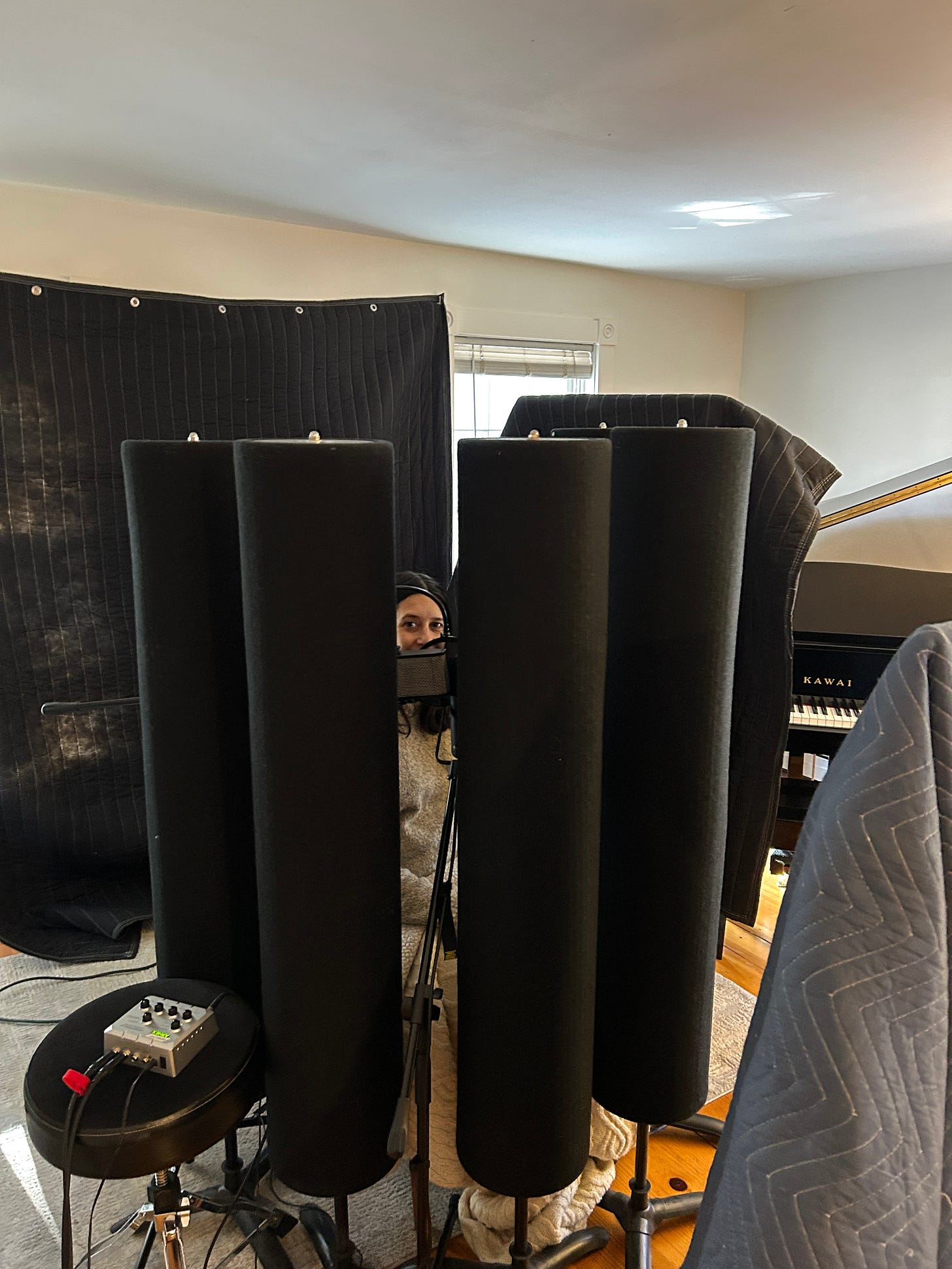There are many things I love about making a record. Recording vocals is not one of them.
I can trace this back to when I was making my first album as Half Waif, KOTEKAN, back in 2013. At my producer friend’s basement studio in the DUMBO neighborhood of Brooklyn, I remember attempting to sing the lead vocal for the song “Ceremonial” some fifty times. Take after take, I could not get it right. Eventually, I erupted into hot, angry tears, grabbed the leash for the studio dog, Dancho, and took the gentle golden retriever outside to get some air. A cold wind was coming up off the East River—another slap to the face. I had studied classical singing for nearly ten years, had always considered myself a capable singer, and yet I could not do this. To fail over and over again in front of my friend was embarrassing and too much for my young ego to handle. As I stroked Dancho’s soft head, gazing into the cut-glass mask of the gray river, I vowed to never record vocals in front of anyone again.
And I didn’t. Through four more albums, I borrowed fancy mics and pre-amps and set them up in my kitchen, bedroom, or closet, nestled inside elaborate forts of sound blankets. I waited for the house to be empty and then I sang, toiling for hours over a song, comping the takes like crazy until I got something I felt was perfect. I was the performer, the producer, and the engineer, shuffling these various hats with increasing frustration and lack of perspective. I called it going to vocal jail. It was a hellish process that sent me into deep spirals of self-loathing, transforming me into some sort of demon as I nitpicked every detail of my voice. But at least I was alone. No one could see me struggle or fail or erupt in anguish. They would just hear the final result: a tall walled garden with trills like frilled roses, hiding the darkness behind it.
I know recording vocals is hard for a lot of singers. It’s an intensely vulnerable part of the process: your body as instrument. Listening back, before you’ve added any effects like reverb to soften the distance, you hear yourself up close in raw form. It can be as punishing as it would be if you stood in front of a mirror naked and took a magnifying glass to every square inch of fat and wrinkle. But how sad is it to not love your vessel, to not love your voice? The thing that has carried you, spoken for you, produced laughter and professed love. We talk about loving our bodies and not shaming the way they age and grow with us. But what about the very heart of that body—not the beating muscle itself but the voice that animates it, connecting us to the world? Could I also honor and love that part of myself—in all its messiness and imperfection?
I’m not sure where my lifelong habit of perfectionism came from, but I do know it has overstayed its welcome. A performance is not, I’ve come to learn, just a place to prove yourself. It’s not only about hitting the notes and landing the pitches. Some of my favorite performances are pitchy and messy as hell, and not for lack of talent or care. Take Sam Amidon, for example, whose creaky voice breaks and squawks across his prolific output, breaking my heart in the best way very time. Or the long held note in Joni Mitchell’s “Blue,” the wild vibrato veering outside the tonal center like a spinning top, expressing a kind of inexpressible keening of the soul. What makes those performances exceptional and memorable is the humanity in them. “If you sing it pretty,” Joni said in an interview once, “it’s going to fall flat. You have to bring more to it than that.”
Last week, I found myself in a more literal kind of vocal jail, seated in the middle of my living room surrounded by a forest of black sound baffles. A fortress with a five thousand dollar microphone at its center. I was recording vocals for my latest full-length album (number six!), but this time, I wasn’t alone.
I was hesitant at first, but I decided to try recording the lead vocals this time with my longtime collaborator and musical brother Zubin guiding me. As with so much of what I learned in the wake of loss last year, I knew it was time for me to let go of my need to control. I needed to trust my body and let the sound move through, as freely and magically as wind over a sand dune, rearranging the shape of things.
At the end of a take, in order to get out of the baffle forest, Zubin had to come and move one of the trees out of the way to release me. He’d reach a hand in to help me maneuver out carefully, and I’d lean my weight into him, my body moving ungracefully yet gratefully as I emerged. You see, sometimes we need help to get out of the jails we’ve built.
And would you believe, I actually enjoyed recording vocals for the first time in my life?
And let me tell you, I think they’ve never sounded better.
And by better, I mean freer.






Hey Nandi, so glad I discovered that you have a substack and wrote this article! "Vocal jail" is such a great term. I'm starting to round up some songs to finish up for release and I'm leaving the vocals until last because of what you describe here. It's comforting to know that someone who can sing as well as you struggles with the same insecurities. Here's my favorite perfect imperfect performance ever:
https://www.youtube.com/watch?v=941PHEJHCwU
❤️